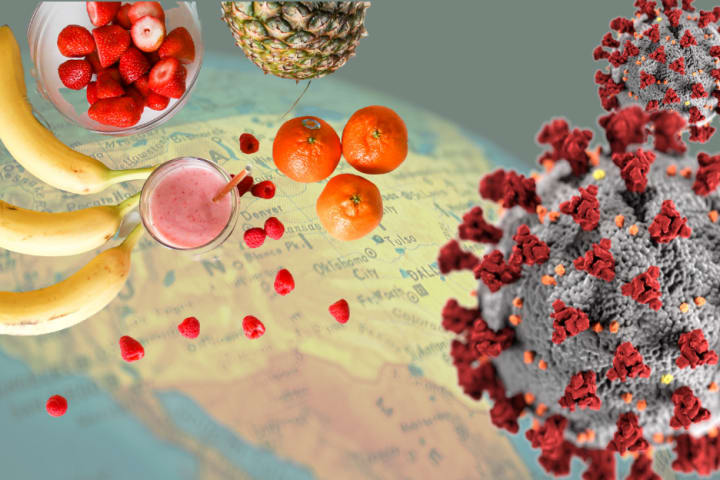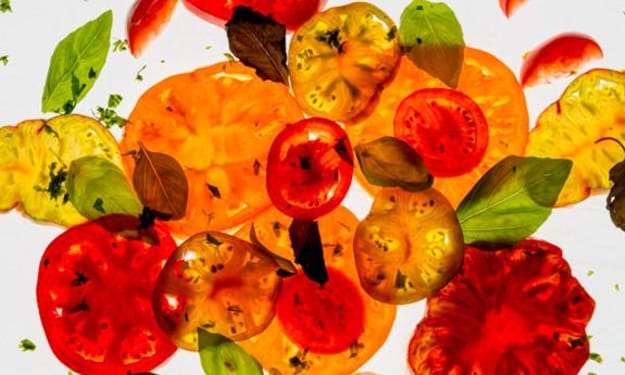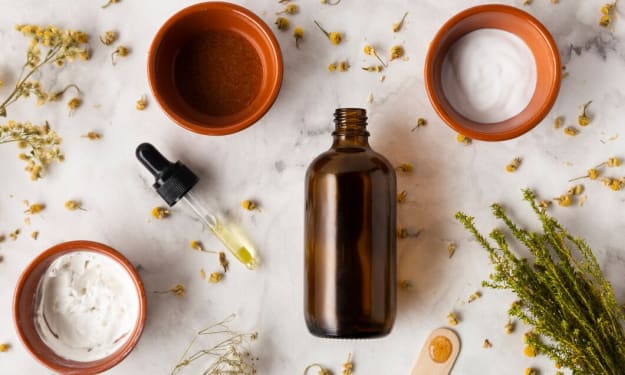FOODS FOR IMMUNITY
How foods enhances Immunity

When Hippocrates said, "Let Food be thy Medicine, and Medicine be thy Food"; he meant eat healthy as food is having power of healing everything. In midst of COVID-19, people are struggling for ensuring their safety and eating healthy. Immunity can be enhanced by taking proper care of the dietary habits. Human body provides an ideal environment for many microbes, such as viruses, bacteria, fungi, and parasites, and the immune system prevents and limits their entry. Article will explore how immune system can be developed, various herbs and nutrient components that can help in enhancing immunity and how they actually act in our body.
Immune system is interaction of cells, tissues and their products that protects the body from pathogens and other foreign substances, destroys infected and malignant cells, and removes cellular debris.

Immune Response is an integrated bodily response to an antigen (foreign body), involving recognition of antigens by specific antibodies (response of body to antigens).
Immunity is the balanced state of having adequate biological defences to fight infection, disease, or other unwanted biological invasion, while having adequate tolerance to avoid allergy, and autoimmune diseases.
Immunity today describes not only resistance to infection and disease, but also preventive mechanisms that help to maintain and support the immune system
FOODS FOR ENHANCING IMMUNITY

Certain plant compounds have been shown in experimental studies to have immuno-stimulating properties. They help stimulate viral defence mechanisms by activating immune cells such as macrophages, lymphocytes (T and B-cell, and natural killer cell), and the cytokines (e.g., interleukin, interferon, and tumour necrosis factor)
Alfalfa powder: Alfalfa is used for kidney conditions, bladder and prostate conditions, and to increase urine flow. It is also used for high cholesterol, asthma, osteoarthritis, rheumatoid arthritis, diabetes, upset stomach, and a bleeding disorder called thrombocytopenic purpura. People also take alfalfa as a source of vitamins A, C, E, and K4; and minerals calcium, potassium, phosphorous, and iron.
Garlic: Aged Garlic Extract has been shown to enhance the function of critical defensive white blood cells. It shortens the duration of colds and flus. Garlic also enhance immune system surveillance against cancer
Probiotics: The gut is a key part of the immune system—this is where the body is constantly exposed to toxins and foreign antigens Imbalances in the gut microbiota may be associated with imbalances in the immune system function, ranging from reduced immunity against infectious agents to allergies and states of chronic inflammation It is estimated that the colon accounts for up to 70% of the immune system. Healthy bacteria in our intestines improves lymphoid tissue that lines the gut wall.
MODE OF ACTION:
• Improves the microbiota composition in the mucosal layers
• Modulate the host immune cell status, probiotics may help to reduce or prevent aberrant inflammatory status.
• Short chain fatty acids also regulate host inflammatory status.
Beta Glucans: Fungus-derived polysaccharide that promote immune response. A yeast beta 1,3/1,6 glucan derived from the cell wall of a proprietary strain of Saccharomyces cerevisiae helps to enhance immunity. Also obtained from medicinal mushrooms including reishi, shitake and maitake, or nutritional yeast. Possesses significant activity against a wide variety of viruses, including the flu, hepatitis and HPV. AHCC: is prescribed in Japan for cancer patients.
MODE OF ACTION:
• Immune cells in the gastrointestinal tract take up β glucan and transport it to immune organs throughout the body.
• Macrophages digest β glucan into smaller fragments. The fragments bind to neutrophils
• It strengthens the neutrophils so that it can move more quickly throughout the body.
• Glucan boosts immune function without over stimulating the immune system.
• Protection against: upper respiratory tract infections (URTI) such as the common cold.
Echinacea: Indigenous to North America, Echinacea was traditionally used by Native Americans for a variety of ailments such as colds, coughs, sore throats, infections, and snake and insect bites. Several varieties of echinacea are available (e.g: Echinacea angustifolia, E. purpurea, E. pallida). Boost production of immune chemicals that stimulate macrophages, the white blood cells that track down and engulf microbial invaders. Recommended as an acute phase remedy to be used at the very beginning and throughout the course of an illness
MODE OF ACTION:
• It contains components like echinacoside and chicoric acid that appear to have antibacterial and antiviral-like properties
• High molecular weight polysaccharides present in Echinacea have potent non-specific stimulatory actions on the immune system, specifically phagocytosis
• Protection against: colds and flus, influenza.
Goldenseal: Hydrastis canadensis- indigenous to North America, Also known as orangeroot or yellow puccoon. Commonly used in conjunction with echinacea for the treatment of colds and flu. According to traditional herbalism, goldenseal is considered to be a tonic for mucous membranes.
MODE OF ACTION
• Goldenseal contains berberine, an alkaloid that has antimicrobial activity against- Vibrio cholerae, Staphylococcus aureas, and Candida albicans.
• Berberine increases macrophage activity, and it is reported to increase blood supply to the spleen, which may help to facilitate the immune supporting activities of this organ.
• It also has immune stimulating properties.
• Hydrastine, another alkaloid in goldenseal, also have antimicrobial-like properties.
• Protection against: skin diseases, ulcers, gonorrhea, and other infectious conditions.
• Infectious diarrhoea, gastritis, infections and inflammation of the mucous membranes, and for digestive disorders. Not recommended during pregnancy.
Andrographis: Andrographis (Andrographis paniculata) is an herb used in areas of Asia and Southeast Asia. Known as kalmegh in India. Contain active compounds andrographolide and neoandrographolide.
MODE OF ACTION:
• Components in Andrographis has immunostimulatory properties and anti-inflammatory properties via adrenal activity.
• Use of an extract of andrographis may help to reduce the intensity and duration of the common cold.
• In one study, patients taking andrographis showed significant improvement in symptoms compared to those taking placebos
• Protection against: acute diarrhoea and for symptoms of upper respiratory tract infection, influenza, fever, and sore throat.
• Also used for stomachic (calms the stomach), tonic, antipyretic, and febrifuge.
Amla: Indian gooseberry (Emblica officinalis), a popular fruit cultivated in India. One piece of fruit about the size of a plum can contain between 700 and 1,000 mg of vitamin C. The vitamin C is considered to be highly stable due to the presence of tannins and polyphenols. It helps to boost immune response, presumably due to its vitamin C content.
Lemon balm: Lemon balm (Melissa officinalis), an herb native to the eastern Mediterranean region and to western Asia. Its components like rosmarinic acid and caffeic acid are reported to possess antibacterial and virostatic properties. Protection against: colds and flu; in functional disorders of the circulation, and for migraines
Astragalus: Chinese immune-enhancing herb used for viral infections, also known as milk vetch root. Frequently combined with ginseng to strengthen immune defences .Studies have shown that Astragalus exerts vasodilatory as well as anti- inflammatory action. Antidote to the immunosuppressive effects of chemotherapy and radiation
MODE OF ACTION: Increases levels of alpha- and gamma-interferon, the body's own antiviral compounds.
DHA: Enhance the production of infection-fighting antibodies and cytokines. DHA-enriched fish oil enhances B cell activation and antibody production. In a study DHA supplementation was found to enhance LPS-induced B cell secretion of immune cytokines IL-6 and TNF-alpha and increase expression of CD40 compared with the control diet.
Cinnamon: Cinnamon (Cinnamomum cassia) is recognized in traditional Chinese and Ayurvedic herbology. Possess antipyretic effects. Cinnamon is a “warming” herb that, from a biomedical perspective, acts as a cardio-tonic, which helps to stimulate blood flow.
Protection against: gastrointestinal complaints associated with colds and flu, including diarrhoea and stomach cramps, nausea, and vomiting
Colostrum/Transfer Factor: The “first milk” critical for priming immunity in newborns, has found application to provide immune support in adults. Produced by mammals within the first 12 hours after birth. Bovine-derived colostrum and transfer factor can help reinforce human defences. Contains immuno-stimulating immunoglobulins, of which the most abundant are immunoglobulins(IgG), lactoferrin, lactoperoxidase, lysozyme and proline-rich polypeptides.”
MODE OF ACTION:
• Triggers at least 50 processes in the new born, including transferring the immune factors and the memory from the mother’s own immune system.
• Contain proline-rich polypeptides (PRPs):modulate the immune system-increasing its activity level in the case of a suppressed immune state, and decreasing its activity level when the immune system is overactive.
• Enhances the immune system, promotes gut health and improves sports performance
Ginseng: Withania somnifera also known as Ashwagandha in India. More than 4000 years it has been used as an immune-system stimulant and remedy for nervous disorders. Contains flavonoids and compounds called withanolides.
MODE OF ACTION:
• Leaf extract of Withania somnifera activates the immune system by enhancing cytokine expression and stimulating the proliferation of T cells (IIIM, Jammu).
• Protection against: anxiety and panic
Fucoidan: Fucoidan is a sulfated polysaccharide composed mainly of fucopyranoside and natural sulphate. It is a dietary component for many island and coastal nations such as Japan, Polynesia and Tonga.
MODE OF ACTION:
• Stimulate body’s natural killer cells
• Increases certain proteins that are produced by white blood cells
• Protection against:
Exhibits strong virucidal activity against the highly virulent avian influenza virus influenza A/H5N1, suppressing virus production within 24 hours of infection.
Thymic Extracts: T-cells and natural killer cells originate from the thymus. Peptides derived from the thymus such as Pro-boost have long been used to promote resistance.
ROLE OF MICRO-NUTRIENTS IN IMMUNITY ENHANCEMENT

Vitamin A: It is essential for integrity of epithelial surfaces. Its deficiency manifest with stratification of cells, followed by squamous metaplasia (change of one kind of tissue into another) and eventually by Keratinisation. Vitamin A deficiency impairs the growth, activation and normal functioning of B lymphocytes.
Vitamin C: Vitamin C shortens the duration of colds and improves the fatigue. It has antimicrobial activities and helps in lymphocyte proliferation. In one randomized, controlled 5-year trial, those who took 500 mg/day of supplemental vitamin C had a 66 per cent lower risk of cold in a five-year period compared to those who took 50 mg/day of supplemental vitamin C.
MODE OF ACTION:
• Increases the SOD and catalase activities (powerful antioxidants) of immune cells.
• It flushes the body of free radicals, protecting delicately balanced hormonal systems from damage from environmental pollutants.
• Increases T-cell proliferation as well as neutrophil motility.
• It also increases circulating immunoglobulin levels
• Leukocytes contain very high concentrations of ascorbic acid that diminish with infection and return to normal after recovery
• Protection against: viral infections such as hepatitis and shingles.
• Most commonly associated with immune health ingredient
• 200 mg–6g a day can treat common cold
Vitamin D: Risk of respiratory infection is twice as high among vitamin D-deficient patients with chronic obstructive pulmonary disease (COPD) compared to lung patients with normal vitamin D levels. Vit. D is located in most tissues and cells of the immune system such as thymus, monocytes and macrophages.
MODE OF ACTION:
• Improves immunity by promoting the body’s production of cathelicidin, an antimicrobial peptide.
• Down-regulates the production of IL-12 and protects from the occurrence of TH1-mediated autoimmunity.
• Protection against: upper respiratory infections (36% more likely to suffer)
Vitamin E: Low vitamin E levels are associated with lowered lymphocyte proliferation responses and serum IgM concentrations. Vitamin E administration to infants increases neutrophil’s phagocytosis but lowers their ability to kill pathogens, possibly due to its potent antioxidant action in reducing the free radicals that mediate this role.
MODE OF ACTION: It enhances both humoral and cell-mediated immunity.
Selenium: Referred to as “ birth-control pill for viruses”. It is effective against cytomegalovirus and HIV. It is a cofactor with glutathione which helps quash damaging free radicals. Selenium nutritional status is also considered to be the driving force for influenza virus mutations.
MODE OF ACTION:
• Modulates the immune system by increasing killer cell activity
• Stimulatory effect on antibody production
• Se is incorporated into a number of selenium-dependent antioxidant enzymes, also known as selenoproteins. These selenoproteins include glutathione peroxidases, which offer antioxidant protection against free radicals and other damaging reactive oxygen species.
Glutathione peroxidases are likely to protect neutrophils from oxygen-derived radicals that are produced to kill ingested foreign organisms.
Zinc: Cures common cold: 75 mg/day reduces cold. Crucial for normal development and function of cells mediating nonspecific immunity such as neutrophils and natural killer cells.
Deficiency also affects development of adaptive immunity. Caution must be taken with zinc because high doses (>150 mg/day) have been shown to be immunosuppressive. In one study, patients consuming lozenges containing 13.3 mg of zinc from zinc gluconate every two waking hours reported fewer days of cold symptoms, such as coughing, headache, nasal congestion, and sore throat.
MODE OF ACTION:
• Zinc supplementation decreased oxidative stress markers and generation of inflammatory cytokines.
• During an infection, zinc is mobilized from circulation to the intracellular compartments of lymphocytes as part of the acute-phase response mechanism.
Additional Readings
1. http://www.pharmabiz.com/ArticleDetails.aspx?aid=95237&sid=9. Sanjay Agrawal (2016) Nutraceuticals play prime role in boosting immunity .
2. http://www.immunesupport.com/ .
3. http://drhoffman.com/article/17-nutraceuticals-that-can-boost-your-immune-response/.
4. http://www.nutraceuticalsworld.com/issues/2010 10/view_features/immune-support-a-healthy-market.
About the Creator
Ekaspreet Kiran
Belong to class of Dreamers and Poets
Follow Instagram ~ @sayspreet for daily updates and motivational content.






Comments
There are no comments for this story
Be the first to respond and start the conversation.